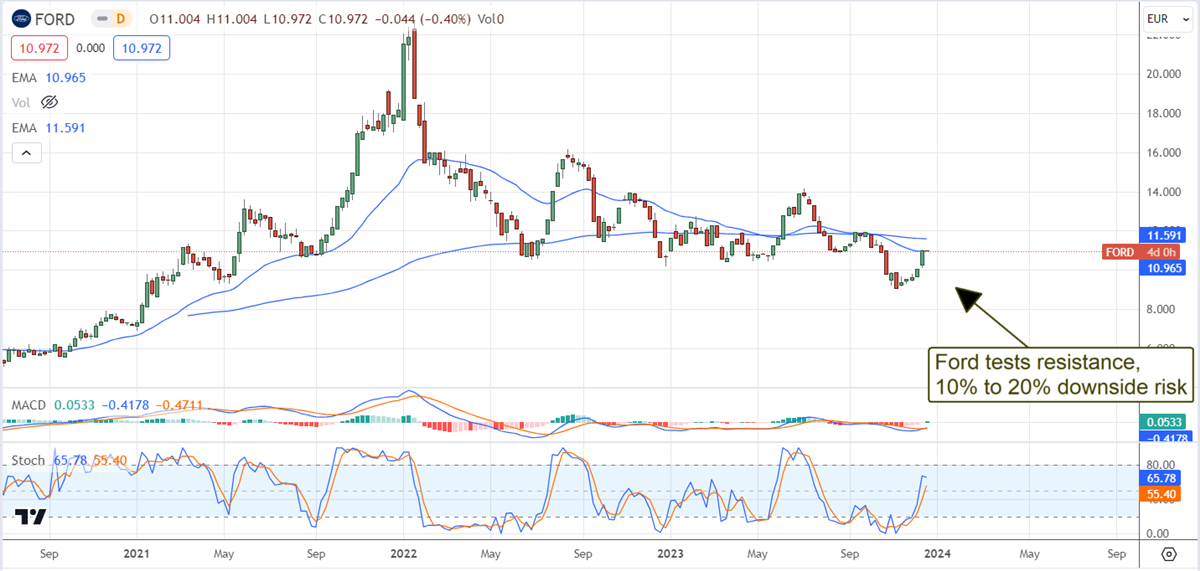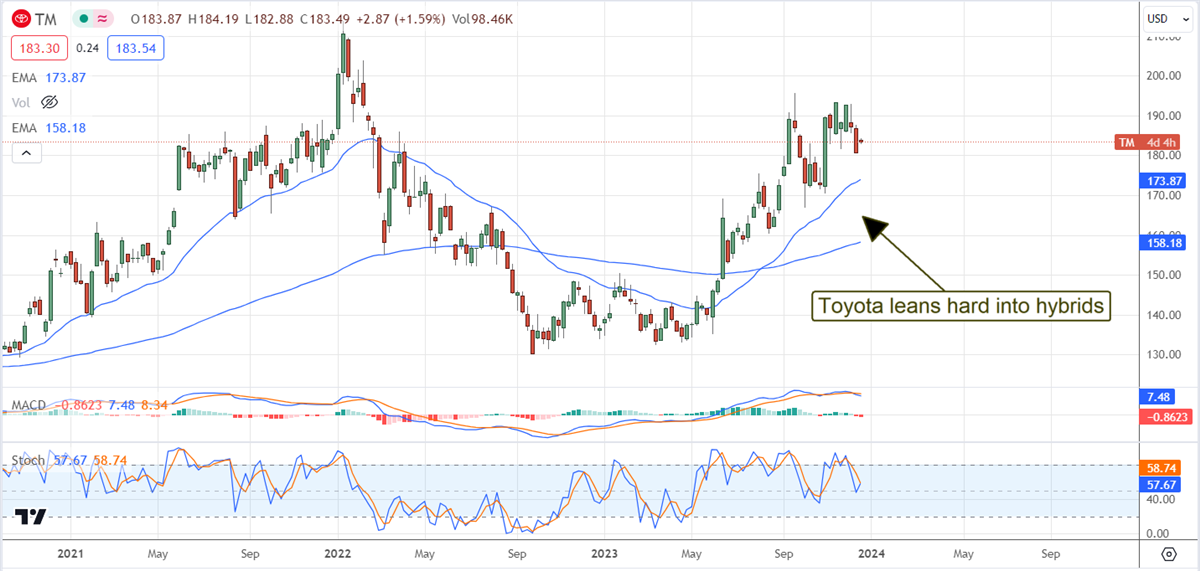The BEV battery electric vehicle market isn’t extinct or even dying. Still, several developments suggest that it has matured quicker than expected, demand is less than forecast, and the hybrid vehicle market is getting a lift. This means that OEMs are turning away from their EV plans and refocusing some of that energy on hybrids. It also means that EV start-ups like Rivian NASDAQ: RIVN and Lucid Motors NASDAQ: LCID may struggle with traction as 2024 progresses.
Ford NYSE: F and GM NYSE: GM are the two most significant players, each pledging billions to their EV plans. Both have begun to scale back production of their flagship EVs, citing demand, including the F0150 Lightning (by half), the Mustang Mach-E and a slate of new models expected to come out over the next two years. Ford, building four battery plants in the US, is also scaling back on battery production.

EVs cost too much; benefits are dubious
What’s wrong with EVs? The most significant complaints from consumers are cost and range, which is nothing new. The average EV costs considerably more than an ICE vehicle, and tax credits aren’t much help. But the problem is more profound than the upfront costs. Because BEV owners must invest in at-home charging supplies and heavier cars use more tires (among other cost differentials), the average BEV costs 15% more than its ICE counterpart in the first five years of ownership.
And that’s not even talking about the green benefits, which are also not generated for several years. A BEV can reach carbon parity with an ICE vehicle within the first 18 months if charged 100% with green or renewable energy, which is nearly impossible today. Charging an EV with carbon-based energy can lengthen that time to 5 years, making EV ownership meaningless in many cases.
However, the most significant hurdle to EV ownership today is infrastructure. Many businesses, including OEMs, are working hard to build EV charging networks but have yet to meet demand. This provides a significant hurdle to many use cases, including continuous operation and long-distance travel. However, there is a solution, and that is hybrids.
Hybrids have several advantages over BEVs
Hybrids have several advantages over BEVs, including cost and emissions. Recent data from Kelley Blue Book shows that hybrids have a lower transaction cost and cost less in the first five years. Not only are consumers not paying for costly batteries and production processes, but the vehicles are lighter, and maintenance is cheaper.
While hybrids contribute to CO2 emissions, they run 35% to 40% of their BEV equivalents and do not need to be charged (using dirty, coal-fired electricity). More importantly, hybrids can refuel as quickly as an ICE and provide continuous and long-distance service.
And hybrids can be even greener. Work by Plug Power NASDAQ: PLUG and Nikola NASDAQ: NKLA proves that hydrogen fuel cells are a viable power source for hybrids. Plug Power has two solutions: one for retrofitting existing BEV systems to a hydrogen fuel cell and the other for OEMs to use as a platform for building hydrogen-powered vehicles. It counts Walmart NYSE: WMT and Amazon NASDAQ: AMZN among its clients; they use hybrid hydrogen fuel cell systems in their warehouse vehicles.
Nikola is making headway with its Tre FCEL long-haul truck. It is seeing growing demand while the BEV version languishes.
Most significant OEMs have at least one hybrid in their lineup. Leaders include Toyota NYSE: TM, which boasts several models that are only available as hybrids. This includes the Camry, which will become hybrid-only with the 2025 model year. The car will feature a 4-cylinder in-line engine to power dual electric motors with 240 horsepower and an expected 50 miles per gallon.

Before you consider General Motors, you'll want to hear this.
MarketBeat keeps track of Wall Street's top-rated and best performing research analysts and the stocks they recommend to their clients on a daily basis. MarketBeat has identified the five stocks that top analysts are quietly whispering to their clients to buy now before the broader market catches on... and General Motors wasn't on the list.
While General Motors currently has a Moderate Buy rating among analysts, top-rated analysts believe these five stocks are better buys.
View The Five Stocks Here
Enter your email address and we'll send you MarketBeat's guide to investing in 5G and which 5G stocks show the most promise.
Get This Free Report
Like this article? Share it with a colleague.
Link copied to clipboard.